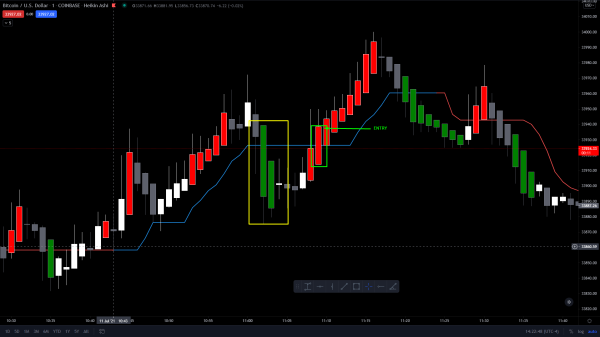Understanding the Different Types of Forex Trading Strategies
Introduction:
The foreign trading market, commonly known as Forex, is a vast and highly liquid financial marketplace where currencies are traded. With an average daily trading volume exceeding $6 trillion, Forex offers tremendous opportunities for individuals and institutions to engage in speculative trading, investment, and risk management. To navigate the complexities of this dynamic market, traders employ a wide range of Forex trading strategies. These strategies are diverse, encompassing various techniques, timeframes, and risk levels, all aimed at capitalizing on price movements and market trends.
What is forex trading:
Forex trading, short for foreign exchange trading, is the act of buying and selling currencies in the foreign exchange market. It is one of the largest and most liquid financial markets globally, where individuals, institutions, banks, corporations, and governments trade currencies against each other. The primary purpose of Forex trading is to profit from the fluctuations in currency exchange rates.
In Forex trading, currencies are always quoted in pairs, such as EUR/USD (Euro/US Dollar), GBP/JPY (British Pound/Japanese Yen), or USD/JPY (US Dollar/Japanese Yen). The first currency in the pair is called the base currency, while the second currency is called the quote currency. The value of a currency pair represents the amount of quote currency required to buy one unit of the base currency.
Forex trading takes place 24 hours a day, five days a week, due to the global nature of the market and the different time zones of major financial centers around the world. The market operates through a network of financial institutions, brokers, and electronic communication networks (ECNs), enabling participants to execute trades electronically.
1. Introduction to Forex Trading Strategies

Forex trading strategies refer to various techniques and approaches used by traders to analyze and execute trades in the foreign exchange market. These strategies aim to capitalize on currency price fluctuations and market trends.
2. Fundamental Analysis Strategies

Fundamental analysis strategies in Forex involve evaluating economic indicators, news events, and central bank policies to assess a currency’s intrinsic value. Traders use this analysis to make informed decisions about potential currency movements in the market.
2.1. News Trading
News trading is a fundamental analysis strategy in Forex where traders make decisions based on the impact of economic news and events on currency values. It involves reacting swiftly to news releases to capitalize on price movements.
2.2. Economic Indicators Analysis
Economic indicators analysis in Forex involves using trading calculator to assess the impact of key economic data on currency pairs. Traders utilize these tools to make informed decisions based on fundamental factors affecting the market.
2.3. Central Bank Policy Analysis
Central bank policy analysis in Forex involves examining the decisions and actions of central banks to gauge their impact on currency values. Traders must be cautious about Forex trade scams when accessing information from unreliable sources.
3. Technical Analysis Strategies

Technical analysis strategies in Forex involve studying historical price data and market patterns to predict future price movements. Traders use various tools and indicators, such as moving averages, candlestick patterns, and support/resistance levels, to identify entry and exit points for profitable trades.
3.1. Trend Following Strategies
Trend following strategies in Forex involves identifying and trading in the direction of established market trends. Traders use technical indicators and chart patterns to confirm trends and ride the momentum for potential profit opportunities.
3.2. Range Trading Strategies
Range trading strategies in Forex involve identifying price levels where a currency pair consolidates within a specific range. Traders look for buy opportunities near support and sell opportunities near resistance to profit from price oscillations within the range.
3.3. Breakout Trading Strategies
Breakout trading strategies in Forex involve identifying key support and resistance levels and entering trades when the price breaks out of these levels. Forex Factory, a popular website, provides traders with real-time market data, economic news, and forums for strategy discussions.
4. Sentiment Analysis Strategies

Sentiment analysis strategies in Forex involve assessing market sentiment to gauge the overall attitude of traders towards a particular currency pair. Traders analyze factors such as news sentiment, social media trends, and market positioning to make informed decisions based on the prevailing market sentiment.
4.1. Contrarian Trading
Contrarian trading in Forex involves taking positions opposite to the prevailing market sentiment. Traders identify overbought or oversold conditions and enter trades against the crowd, aiming to profit from potential market reversals.
4.2. Market Sentiment Analysis
Market sentiment analysis in the Forex market involves assessing the collective attitude of traders towards a currency pair, which influences price movements. Traders use this analysis to gauge sentiment shifts and identify potential trading opportunities.
5. Scalping and Day Trading Strategies

Scalping and day trading strategies in Forex involve executing multiple short-term trades within the same day. Scalpers aim to profit from small price movements, while day traders seek to capture larger intraday price swings. Both approaches require quick decision-making and effective risk management to succeed in the fast-paced Forex market.
5.1. Scalping Techniques
Scalping techniques in Forex currency refer to short-term trading strategies where traders aim to make quick profits from small price movements. Scalpers execute multiple trades throughout the day, holding positions for only a few seconds to minutes.
5.2. Intraday Trading Approaches
Intraday trading approaches in Forex involve executing trades within the same trading day. Traders use various strategies, such as technical analysis, chart patterns, and market indicators, to identify short-term opportunities and capitalize on price movements during the trading session.
6. Swing Trading Strategies

Swing trading strategies in Forex involve holding positions for several days to weeks, capitalizing on price swings within larger trends. Traders use technical analysis, chart patterns, and trend-following indicators to identify entry and exit points, aiming to capture significant price movements and maximize profit potential.
6.1. Fibonacci Retracement
Fibonacci retracement is a popular technical analysis tool used in Forex trading. Traders use Fibonacci levels, derived from a mathematical sequence, to identify potential support and resistance levels, aiding in predicting price corrections and trend continuation.
6.2. Moving Averages Crossover
Moving averages crossover is a technical analysis technique in Forex where two different moving averages, such as the 50-day and 200-day moving averages, intersect. Traders interpret this crossover to identify potential trend reversals or changes in market momentum, helping in making buy or sell decisions.
7. Carry Trade Strategy

The carry trade strategy in Forex involves taking advantage of interest rate differentials between currencies. Traders borrow money in a low-interest-rate currency, use the funds to invest in a high-interest-rate currency, and profit from the interest rate spread. However, like any Forex strategy, it carries risks, and traders should be cautious when engaging in cargo Forex trading.
8. Position Trading Strategies

Position trading strategies in Forex involve holding positions for an extended period, ranging from weeks to months or even years. Traders focus on fundamental analysis and long-term market trends, aiming to capitalize on significant price movements and maximize profit potential.
9. Algorithmic Trading and Expert Advisors

Algorithmic trading in Forex involves using computer algorithms to execute trades based on predefined rules and strategies. Expert Advisors (EAs) are automated trading programs that operate within MetaTrader platforms, allowing traders to execute trades automatically and efficiently, based on specific criteria and conditions.
10. Risk Management in Forex Trading

Risk management in Forex trading involves implementing strategies to control and mitigate potential losses. Traders use techniques such as setting stop-loss orders, position sizing, and diversification to protect their capital and maintain long-term profitability.
11. Choosing the Right Strategy for You

When choosing the right Forex trading strategy, considering your risk tolerance, time availability, and expertise is crucial. Traders should also factor in the impact of Forex news on their chosen strategy, as economic events can significantly influence currency movements and may require adaptation or caution in executing trades.
Conclusion
In conclusion, understanding different Forex trading strategies is essential for navigating the dynamic Forex exchange market. Whether employing fundamental, technical, or sentiment analysis, traders can capitalize on various market conditions. Careful consideration of risk management and adapting to Forex news events can enhance success. By choosing a strategy aligned with individual goals and risk tolerance, traders can increase the potential for profitable outcomes in the Forex exchange market. Feeta.pk is a property portal, always exercise caution and do your research when dealing with any property portal or real estate platform.
Understanding the Different Types of Forex Trading Strategies
- Published in Europe, forex, forex, International, Investment, Investment Tips, Investments, uk, USA, viral, Zillow
Tips For Investing In Gwadar Property
For Investing In Gwadar Property, Gwadar is located on the southwestern coast of Baluchistan. It is a port city located on the shores of the Arabian Sea opposite Oman.
Gwadar has been developing its infrastructure at a rapid pace. It is known to be a pivot of China Pakistan Economic Corridor. The investment influx in Gwadar is unprecedented. Experts have marked Gwadar as a game-changer for Pakistan’s real estate.
Investing In Gwadar:
When investing in any business project, one should do a background check and be aware of the pros and cons of the investment. For a profitable investment, one should do research beforehand. In real estate, one should search the area before investing. Some profitable areas for investing in Gwadar are the Sangar Highway scheme, New World City, GDA Housing Scheme, New Town Housing Scheme, and Gwadar Industrial Estate.
Tips for Investing in Gawadar:
The investment area’s prominent features should consist of amenities including green areas, hospitals, education facilities, parks, entertainment facilities, fuel stations, and transport facilities.
One should invest in an area that is up and coming as it allows one to be part of the development before the prices rise. The idea goes well for Gawadar as it’s an up-and-coming project, and investment in its property will be profitable.
Gwadar has a location that is planned to be used strategically for trading purposes of the country. Gwadar is to become such that all exports and imports will pass through its deep-water port. The imports will be from China, and exports will be to and from Africa, the Arabian Gulf states, the Middle East, and Europe. There will be a facility of a floating liquefied natural gas facility built as part of the $ 2.5 billion Iran-Pakistan gas pipeline project.
Demand For Property:
The demand for property in Gwadar has been rising, and the indicator of it is the construction carried out in the special economic zones of the city. The inspiration for Gwadar has been taken from Shenzen. Shenzen is a zone of China. Before its development, Shenzen had a population of 30,000 and today consists of between 13 to 20 million.
If a fraction of what happened with Shenzen takes place in Gwadar, the demand for real Estate in Gwadar will skyrocket. The statistics show that in 2014 Gwadar consisted of a population of 85000 inhabitants, and its current population is estimated to be 250,000.
Documentation Of Property:
Scams have been common in all parts of a business; one should be cautious when investing. CPIC helps with providing all required documents on time after the completion of the purchase. Faulty or non-existent paperwork may be provided as original to scam the investors. To ensure that the documents are original, CPIC comes in handy.
Budget:
Real estate requires making the right choices as an investor. It requires knowing one budget; how much an individual needs to spend, including extras and not just the purchase. The extra pay may include legal fees, tax fees, and other payments. The best idea is to keep extra cash on hand for expenses one may not have calculated or even thought of.
Once details are collected, one can get an idea of how much one can afford. One method to make a purchase at the best price is by being assisted by consultants and being transparent about one’s budget and costs throughout.
Reliable Construction:
The first step of investing in Gwadar would be buying a plot of land. The next step is to actually start the construction of a home on the plot of land bought. The reliable move would be to hire tradesmen who can get done with the construction on time at a reasonable price.
Make A Flexible Investment:
Investing in land is a secure asset and won’t wear out, or get broken, stolen, or destroyed. A finite amount of land is available in Gwadar, and prices are rising per investment; invest in land to rent out or to use yourself.
For the latest updates, please stay connected to Feeta Blog – the top property blog in Pakistan.
Tips For Investing In Gwadar Property
- Published in Investing In Best Deals, Investment, investment property, Investment Tips, Investments, News & Updates, property, Property In Pakistan, Property News, Real Estate, real estate business, real estate financing, Real Estate Guide, real estate investing, real estate investment, real estate market, Real Estate News
Avoiding the Real Estate Wealth Trap in Pakistan
Beware, this article will change your mindset and real estate investments, so read it carefully while we reject the false rich trap of real estate in Pakistan. Read this carefully and if you have any questions please comment and ask.
After nearly 10 years of going through various cycles of real estate myself, I’ve realized that most of us don’t create any real wealth. Do we live in a paradise of fools and amass false wealth? This prompted me to do some research and analysis of the previous 15 years of investment cycles to find out what exactly we are doing wrong.
During our search for the truth about real estate, we learned that there is a huge difference between returns in USD and PKR. While you may think you made money in PKR, this may not be true for USD. Eventually, almost every other thing in your life and your purchasing power depends on the USD and not on PKR. This means that if your wealth does not grow by the USD, then you are not actually getting richer.
USD is therefore one of the most important factors of wealth creation. This is especially true for foreigners who invest in USD and expect to take their returns in USD.
The Dollar vs. PKR and Real Estate Investments
Just to understand how important this aspect was, we will choose Phase 6, 1 Channel plot in DHA Lahore as an example and compare its price in various years since 2005 in USD. Most real estate investments follow a similar pattern with small variations.
Year 2005
1 x USD = 60 PKR
Average price of DHA Lahore Phase 6 in 2005 = 9 Million ($ 150,000)
Year 2010
1 x USD = 80 PKR
Average price of DHA Lahore Phase 6 in 2010 = 6.6 Million (USD 82,500)
Year 2013-2014
1 x USD = 100 PKR
Average price of DHA Lahore Phase 6 in 2013 = 15 Million ($ 150,000)
Year 2016
1 x USD = 105 PKR
Average price of DHA Lahore Phase 6 in 2016 = 24 Million (USD 228,571)
Year 2019
1 x USD = 160 PKR
Average price of DHA Lahore Phase 6 in 2019 = 28 Million (USD 175,000)
Year 2021
1 x USD = 172 PKR
Average price of DHA Lahore Phase 6 in 2021 = 42 Million (USD 244,000)
Long Term Business
Looking at the USD chart for Phase 6, 1 Channel plot is very clear that long-term trading is almost worthless. I know a lot of people who have kept plots in these phases for over a decade and although you may have overcome inflation or PKR depreciation, you have not created significant wealth.
Most people have this idea that the longer they keep a plot or file, the more fruitful it is. Unfortunately, I hate to report this bad news, which is not the case. At least the property in Pakistan does not adhere to that law. In 2005 the plot which was at USD 150000 is only USD 244000 today. Even buying it in 2019 gives you a much better ROI instead of buying it 14 years earlier in 2005.
Actually buying the phase 6 plot in 2010, then selling it in 2016 and buying it again in 2019, and selling it again now in 2021 would be really quite lucrative.
The reason that devalues a long-term business is that someone who has held the same property for 15 years earns much less money than someone who has held the same property for 10 years. This same aspect makes long-term trading riskier, which can eat away at your wealthy creative endeavors like a termite.
Business Plots and Files in Speculative Cycles
The speculative trading cycles are the next option that most investors choose. It’s a really good choice but with just two big problems:
- You never know what the future holds. So everything you do is based on either guesswork or information that may not work exactly the way you want it to. It’s much easier to just look at the past data and see where you should have invested but planning it for the unknown future is not for everyone.
- If you can’t execute or the market doesn’t work as you hoped, you may be sucked in for a very long recession period.
Speculative trading is much easier said than done and it wasn’t until 2016 when the recession hit the real estate that investors realized what they were doing wrong. A considerable portion of investment has stalled in some areas because some investors felt it was worth trying to wait and hold on. These areas included Broadway Phase 8 commercial, residential plots in various places such as Phase 7, 8, and 9 of DHA Lahore, Malikpur, Shivpur 4 marl commercial files of DHA in Phase 8 ex Park View, and later on Gwadar.
As a result with a huge share of investments stuck in recession, investors have failed to seize new opportunities that have emerged from 2017 to 2020 such as indigo highs, Goldcrest Mall, DHA Peshawar, Downtown Mall and DHA Multan.
Although the return on investment was much better than long-term trading, but still not very impressive, as it included long periods of recession with zero to negative growth.
keyboard_arrow_leftPrevious
Thenkeyboard_arrow_right
What does the data say?
For an argument, let’s assume that everything went well and being the smart guy who is Mr. X, he kept money safe in the bank from 2005-2010 and then invested in phase 6 plots in 2010, then took an exit in 2016, and then took entry again in 2019 and has taken an exit now when the average plot price is at 42 Million.
To achieve this, Mr. X needed to make seven decisions during these 16 years. These included selling in 2005 and then investing in reliable locations to earn at least 10% a year. Taking an exit from wherever your money was and then reinvesting in 2010 in real estate. Repeating the same thing again from 2016 to 2019 and then finally taking an exit in 2021.
The location for an error is almost nil, if Mr. X had taken an exit in 2013, it could have gone awry. Similarly, if Mr. X could not take an exit in 2016 the results would be different.
Finally, it was also important to carry out a profitable business during the recessionary periods between 20015-2010 and then in 2016 to 2020. Timely exit from these investments and regaining entry into real estate should be surgically accurate.
How many of you are confident that you can read the market and do this type of business in the future?
The Good Old Rental Income
Rental income has always been considered a very essential and important source of income. However, not many people believe that it can enrich you as a speculative business. Some general problems you may encounter with rental income are:
- If you do not invest in the right rental property, your capital gains may suffer.
- Houses in Pakistan are the worst form of rental income due to huge depreciation and only 3 to 4% rent per year.
Choosing a rental property that would give you at least a 6% rental yield and some good capital gains over the years can be a challenge, but it is much easier to execute than a speculative business. In addition, you now have the option to invest in real estate that can offer an 8 to 10% return on annual rent above your initial investment.
Rental cash flows may seem minimal when you start, but over time they build up and give speculative traders a run for their money. It won’t be wrong to say that slow and steady wins the race because you have a much better chance of being rich if you invest in rental properties instead of plots of land.
What does the data say?
Now for the sake of argument let’s say, Mr. A, who is not as wise as Mr. X and was not sure if he can pull off that miraculous 16-year cycle with such precision. That’s why he decided to buy a property that gave him regular cash flows and average capital gains.
Mr. A has invested € 9 million in wolf ownership, which has given him an average of 10% in annual capital gains and 6% in rental income, which has increased by 10% a year. Ultimately, he invested his rental income in assets similar to where Mr. X kept his money during recessions to make 10% profits a year on them and the results will surprise you.
YES, it is quite true that Mr. A made almost the same amount of money as Mr. X and without ever having to go into the complications and risks that Mr. X took.
The magic actually happened because of the compounding effect on the rental income, this is one factor we never consider when we discuss rental properties.
The 16 years of rental income, which started at just 540000 a year, ended at 4 crores when accumulated and put together at only 10% a year. This is where most of you do your math wrong and only calculate the rental income and do not consider the impact of profits on your rental income.
keyboard_arrow_leftPrevious
Thenkeyboard_arrow_right
The way forward
The speculative business cycles of real estate and rental income are almost equal when creating real wealth. Renting is an easier and more stable way to secure your success compared to speculative trading. You can certainly mix them both or opt for rent alone, but I would never recommend just opting for a speculative trade.
Lesson learned
- Rental projects are always green investments that will give you good profits in almost any market.
- Rental properties are the backbone of your real estate investment.
- Plots and files should be invested only for speculative business cycles.
- Long-term keeping of plots and files is counterproductive in general and has not rewarded investors in the last 15 years.
- For better chances of success, rent is much more effective than any other investment in real estate.
For the latest updates, please stay connected to Feeta Blog – the top property blog in Pakistan.
Avoiding the Real Estate Wealth Trap in Pakistan
Minimalist Interiors: Natural Wood Finishes
Like Architecture and Interior Design? Follow us …
Thank you. You have been subscribed.
![]()
The Minimalist Interiors can be effectively communicated by a sharp and sharp aesthetic that makes a bold effect, or it can be more gently conveyed by a soothing natural environment that arranges the soul. The two home interiors we present here today are rounded with palpable curved edges, a beautiful natural wood tone and cushioned soft furniture. Minimalist white backgrounds are warmed with creamy undertones that complement the natural hue of the honey-toned wood elements. Home accessories are few and far between. Subtle lighting patterns are threaded around the perimeter of the room to form apartments and bedrooms that are atmospheric, welcoming and soothing to the eye.
The slender fireplace extends beyond the firebox to form a floating media under the retractable projection screen. The elegant speaker that stands on it is a Bang & Olufsen Beoplay A9.
The master bedroom is dressed in natural wood, which creates a comfortable cabin-like feel. A large, comfortable chair, a slender floor lamp and a small wooden side table form an inviting reading corner. A footstool would make a welcome addition but instead a clear footpath is prioritized around the bed.
Did you like this article?
Share it on any of the following social media below to give us your voice. Your comments help us improve.
For more information on the real estate sector of the country, keep reading Feeta Blog.
Minimalist Interiors: Natural Wood Finishes
Buyer’s Market vs. Seller’s Market: Know the Difference
Would you like to sell or buy a home at the best time of year? Despite the fact that certain seasons may be busier than others, the fluctuations in the real estate market are much more influenced by supply and demand than by the time of year. Keeping an eye on the housing market is one of the most important things to watch and watch out for whether you’re in a buyer’s or seller’s market in your local area.
Everybody wants the best deal on a new home, but it’s not always easy. In the wake of the COVID-19 pandemic prospective homebuyers have had a difficult time answering the question, “Why are houses so expensive at the moment?”.
In order to save on a new home and avoid overspending on the mortgage, savvy homebuyers try to time their purchases around buyer’s markets.
When purchasing a house, it is important to know the difference between buyer’s markets and seller’s markets. Let’s find out more with this blog.
What Is a Buyer’s Market?
Buyer’s markets occur when more homes are for sale than buyers are available. It means that more homes are listed for sale than there are buyers. Buyer’s market often refers to the state of a market where there is relatively more inventory than demand.
Lower home prices are an indicator of a buyer’s market. A seller’s home will often sell for around the listing price or even less in a buyer’s market. You cannot raise your asking price much without causing buyers to look at comparable homes offered by other sellers in your neighborhood.
Due to the volume of competition, sellers are at a disadvantage. Many sellers decide to accept a lower sale price instead of waiting for the right buyer to come along.
Seemingly longer than average time on the market is another sign of a buyer’s market. There’s likely a buyer’s market if the for-sale signs aren’t replaced with sold signs as you drive through your neighborhood. There is little chance of seeing a bidding war over a house on the market. With so many homes available, buyers are unlikely to spend more than the asking price.
What is a Seller’s Market?
During a seller’s market, the number of buyers overrules the number of available homes on the market or when there are more buyers than available homes. A single property often attracts multiple buyers, resulting in a bidding war. Selling your home in a seller’s market can be a great option because you can get a higher sales price than your listing price, or at least more than your bottom-line price (the lowest price you’re willing to accept for your house).
Be aware of the seller’s advantage when buying a home in a seller’s market. The advantage of getting a lower sale price on a property that other buyers are interested in is unlikely if other buyers are also interested.
An offer made by a competing buyer could cost you the opportunity to buy the property. The seller’s market is sometimes referred to as a renter’s market because sometimes prospective buyers must continue renting until they can raise their down payment and compete with other buyers.
According to a licensed realtor from FL Cash Home Buyers – the key to selling a property fast is to utilize as broad of a net as possible for buyers. The key to this is to find the right realtor. Realtors can help sell a house not only quicker but usually more profitably and as legally correct as possible.
The market for Buyers or Sellers? Find Out with These 4 Tips
A buyer’s or seller’s market can be determined without being an expert in it real estate. The easiest way to tell can usually be found by looking at current and recently sold listings.
A buyer’s market has the following characteristics
- Sales of homes are slow
- The homes sell for less than the list price
- The home price index is declining
- There are many homes available for sale
A seller’s market has the following characteristics
- Houses sell quickly
- The home sells at or above the listing price
- The price of homes is rising
- There aren’t many homes for sale
A Few Tips for Buyers
When there are limited housing options and a lot of buyers are interested, time is of the essence.
- A seller’s market is an excellent time to act fast if you find your dream home. Those who hesitate over a house they want to buy may find it is no longer available by the time they are ready to negotiate. Getting pre-approval for a loan before you need it will ensure financing.
- Make sure you know you’re at a disadvantage before you make an offer. There is no need to push for specific closing dates, concessions, or contingencies in a seller’s market. Make sure you focus on what’s important to you. Make sure you think twice about stipulations you want to be written into the contract. Make an all-cash offer if possible. Since cash buyers don’t have to deal with financing issues, sellers prefer them.
- Having patience is crucial when you keep losing out on the homes you are interested in. Don’t get discouraged if you keep losing out on homes you are interested in. Frustrated buyers end up suffering in a seller’s market. Many inexperienced bidders engage in bidding wars to get the home they want, even if the home isn’t worth much. That’s not a good idea.
- If you are tired of losing, you may end up making an offer on a home you wouldn’t usually be interested in. Property ownership is an investment and often a 30-year commitment. Don’t get sucked into a low-cost house. You’d be better off waiting until the market cools off before starting your home search.
A Few Tips for Sellers
To increase interest in your property in a seller’s market, you’ll need to compete with other sellers.
- Before you market or show your property, make sure your home is clean and organized, and in good condition.
- The price of a home tends to rise in a seller’s market, but pricing your home relatively still helps. You’ll be more likely to attract buyers if you lower your asking price slightly below fair market value. It is common for sellers to list their homes slightly below their assessed value to encourage bidding wars.
- Examine offers carefully: During a seller’s market, it’s even more important to consider offers carefully. In their search for the highest offer, sellers frequently ignore the buyer’s financial strength. If buyers say they will pay a certain amount, that doesn’t automatically mean they can get the funds. The appraised value of your home cannot be financed beyond that.
- Your last concern should be accepting an unrealistic offer and then having to resell your home when the deal falls through. Buyers will have more power when negotiating when your house has been on the market longer.
- Make sure any buyer who requires financing is preapproved for a loan. When buyers receive pre-approval, their credit and finances are verified, ensuring they can obtain a loan for a specific amount. Prequalification, however, is merely an estimate of a buyer’s finances.
- Observe contingencies: Also, be aware of offers that include contingencies. In the event that certain conditions are not met, buyers can back out of sales contracts, including mortgage house contingencies, home sale contingencies, appraisal contingencies, and inspection contingencies.
- According to Phil from Cash offer Please, Many homeowners choose to sell their homes through a real estate agent in order to get the best price. However, you may be able to sell your home for less than market value by making a cash offer to the buyer.
Summary
Knowing where the market stands is beneficial when buying or selling property. There is less competition for buyers in a buyer’s market when there are many homes available. On the other hand, a seller wants to list their house during a seller’s market when there are fewer properties for sale and a high number of interested buyers.
It is still important to hire a real estate agent, regardless of the market conditions in your area. A real estate agent can give you a leg up on your competition, regardless of market conditions.
Choosing the right time to buy a home can be a major challenge. In a seller’s market, you will notice that homes disappear almost immediately after being listed. To avoid losing out on what could be your dream home, you should get preapproved as soon as possible instead of waiting until the last minute.
Buyer’s Market vs. Seller’s Market: Know the Difference
51 Tea Rooms Design Ideas With Tips And Accessories To Help You Design Yours
Like Architecture and Interior Design? Follow us …
Thank you. You have been subscribed.
![]()
The inseparable Tea Rooms Design culture of East Asia is well-known, where tea is much more than just a pleasant drink. Not only is tea enjoyed in person and at social events, in small tea parties and in public teahouses, but many cultures have created intricate formal ceremonies around the act of tea preparation and service. While East Asian tea ceremonies differ between countries, the ritualistic nature of the drink is agreed upon. This pleasant daily observation has inspired the inclusion of personal tea rooms within modern homes, which is what we are exploring here today. From traditional Asian tea tables and tatami mats to contemporary interpretations of the theme, we will discover how to raise tea at home.
The seating label in a traditional Chinese tea house conventionally requires that the first guest of honor be located on the left side of the host. The remaining seats are allocated in descending order to the right. Therefore, a common bench will most likely come after single seats if the length of the table allows.
Did you like this article?
Share it on any of the following social media below to give us your voice. Your comments help us improve.
Also, if you want to read more informative content about construction and real estate, keep following Feeta Blog, the best property blog in Pakistan.
51 Tea Rooms Design Ideas With Tips And Accessories To Help You Design Yours
- Published in decor, Designs by Style, dining room, houses, interesting designs, interior, Interior Decoration Ideas, Interior Design, interiors, International, Investment, tea rooms, uk, ukraine, USA, viral, Zillow
Choosing Construction Materials for Your Home
Being the foundation of any house – construction materials should be selected after thorough research and evaluation. Anesthetic design with sustainability is only possible with the proper construction material. However, many remain unaware of the significance of choosing the right materials, foregoing this important step entirely.
To help you make the right decision for your home, Feeta.pk brings you a complete guide on how you should choose construction material for your house.
Estimate your Costs
The construction market offers a wide variety of quality construction materials. However, their prices may vary significantly. Opting for the highest-grade materials should be the right move if you have a limitless spending budget since durability and sustainability are the utmost priority.
However, there will be a limited spending budget in most cases, and finding the perfect materials for your home under a limit can be quite tedious. As a general rule, choose cost-effective materials without compromising overall quality. Estimating a budget can help know how much you can spend on materials, cut down on unnecessary costs and make room for better construction materials.
Availability of Materials

Source: EnvatoElements
Before deciding on any materials, it is essential to determine their availability in the market. Materials that are either rare or unique can become impossible to find in the market, or they might have to be shipped from a different country. This can raise costs and delivery times for the construction and building materials, affecting the overall timeline for the construction of your house.
Climate Conditions

Source: EnvatoElements
Construction materials for homes greatly depend on the climate conditions of the area. Factors such as average rain, snowfall, sunlight, and temperature are essential determinants of the materials. Some materials perform better in cooler temperatures, while others deteriorate under heavy rain or snowfall. This makes it necessary to consider the whole climate while choosing construction materials.
Sustainability

Source: EnvatoElements
With climate activism at an all-time high, the construction industry has also taken a few steps to incorporate sustainability. Construction materials are responsible for a significant portion of the world’s carbon footprint, especially materials such as cement. This has led to a rise in the use of eco-friendly construction materials. If you want your house to be greener, the construction market has several sustainable options that you can explore.
Aesthetic Appeal

Source: EnvatoElements
Another factor to take into consideration while choosing materials is their aesthetic appeal. Construction materials can drastically change the aesthetics of your house. For instance, laminated wooden flooring can give your home a touch of elegance, while opting for ceramic tiles can offer a minimalistic appeal.
The materials that you choose should also complement the surroundings of your house. A log cabin-style home may look pleasant in the hills of Murree but not so much in the streets of Lahore. Your home’s aesthetic appeal should mirror its surroundings while incorporating your unique taste.
Durability

Source: EnvatoElements
Durable construction materials are essential for any home, increasing lifespan and lowering maintenance costs. Some materials can offer universal durability, while others are climate-dependent. Generally, construction materials should be repellent to moisture, corrosion, and other environmental conditions such as heavy rain.
Structural Integrity

Source: Pinterest
For construction materials, it boils down to structural integrity and performance. The materials that you choose should withstand heavy loads and excessive weights. The choice of materials should be evaluated, and there should be no compromise on quality. Anything made out of poor quality can become a safety hazard.
Maintenance

Source: EnvatoElements
The best construction materials are those that require minimal maintenance. Maintenance is necessary for preserving your home’s original look. However, it can also rack up additional costs over time. To avoid these costs, opt for high-grade quality materials as they offer higher durability and less maintenance over time.
Construction material should always be selected after thorough research. Factors such as durability, aesthetics, and climate conditions should be considered. However, the general rule of thumb is to never compromise on quality, as these materials are the core of your house. For more information on construction materials, visit Feeta.pk – Pakistan’s first online real estate market.
Choosing Construction Materials for Your Home
Are You Sure Are You Making A Safe Investment?
When you are spending your hard-earned money on investing, there is always this nervous feeling that makes you question whether you are making the right decision or not. To minimize any risks involved in this and make sure of the right investment, there are several measures that you can take. However, it is important to be mindful of the fact that investments do fluctuate with time, sometimes giving very high profits and sometimes even less than what you spent.
In this article, Feeta.pk is going to help you get familiar with the measures that you can take to know if the investment is genuine or not. Let’s find out how you can be sure of what you’re doing is a safe option.
Identify the Red Flags
Red flags in investment are usually pressure tactics that are used to unintentionally lure your mind to be alarmed and go for it. Let’s take the example of ‘Limited Time Offer’ or ’10 days left to get this at half price ‘will make you feel you will be left out. Trusted companies that are offering opportunities to investors always know that people will need time and will come to them on their own, instead of such offers.
Look in the ‘Right Place’
It is important to start looking for investment options at the right place. What we mean by this is to look for authentic sellers and properties which belong to a verified housing society. You can also find new options which are yet to grow and have a margin of growing rapidly in a short time, but that is still a risk if the seller and area are not coming under a genuine tag.
What you can do is talk to area property agents, and also lookup online for any new property areas that you are interested in. Feeta.pk is an authentic site for you to start looking for investment properties with. Feeta’s property agents are well-equipped with area wise knowledge to help you get an idea of what property is a safe option for you.
High Publicity Does Not Mean ‘Safe’
Generally, highly publicized projects are a great option to go with because they are luring big investors and have also developed a reputation they would not want to ruin. However, sometimes, it can also be misleading given that they might be expanding on illegal land and your money might go down the drain. You have to weigh all the sides before making a decision, for instance, hearing from other people, getting a professional agent involved, asking for legal document proof of their project being genuine.
Good and safe projects have a way of making their way around town through word of mouth, so you can evaluate your option by talking to a few people who are in the investing business.
Learn About the Company You’re Investing With
When getting your money involved, checking on the company and the team of directors/owners is a crucial step that you should always take. Look about the owner’s portfolio, any other projects they have, how they are performing, and you can even take the help of other people in learning about the company.
You can also verify the address, phone number of the company, or any reviews that might be up on the internet before getting yourself involved. If you are unable to find any proper information or come to any negative conclusions about the company, it is better to steer clear of it and look for other options.
Keep Your Timeline in Mind
There is no shortcut to becoming rich overnight, and the same goes for any investment. You can’t expect your investment to bear good profits in a matter of days, you’ll have to choose where to invest according to the timeline you want your profit back. That will help you determine the type of project you want.
So if you want good returns in a short amount of time, don’t hurry into investing just anywhere. Take your time to analyze what your options are, how the market in the areas is trending, and which area will bring you the most profit in the time frame you need it.
These simple pointers will help you land a very safe and secure investment which will help you get a good profit over some time. If you are confused about safe property investment, you can get in touch with Feeta.pk and find out the very best options of authentic properties for you.
Are You Sure Are You Making A Safe Investment?
- Published in International, Investing In Best Deals, Investment, investment property, Investment Tips, Investments
Difference Between Buyer’s Market and Seller’s Market
Everyone wants the best deal on a new home, but it’s not always easy. After the COVID-19 pandemic, prospective homeowners found it difficult to answer the question, “Why are houses so expensive nowadays?”.
To save on a new home and avoid spending too much on the mortgage, wise homebuyers try to time their purchases around the buyer’s markets.
When buying a home, it is important to know the difference between the buyer’s markets and the seller’s markets. Let’s find out more with this blog.
What Is A Buying Market?
Buyers ’markets occur when more homes are sold than buyers are available. It means that more homes are listed for sale than there are buyers. A buyer’s market often refers to the state of a market where there is relatively more inventory than demand.
Lower home prices are an indicator of a buyer’s market. A seller’s home will often sell around the list price or even less in the buyer’s market. You can’t raise your asking price much without getting buyers to look at comparable homes offered by other vendors in your neighborhood.
Due to the volume of competition, sellers are at a disadvantage. Many sellers decide to accept a lower selling price instead of waiting for the right buyer to come.
Apparently longer than average time on the market is another sign of the buyer’s market. It’s probably a buyer’s marketplace if the counters aren’t replaced by sold-out signs as you drive through your neighborhood. There is little chance of seeing a bidding war on a house on the market. With so many homes available, buyers are unlikely to spend more than the asking price.
What is a Vendor Market?
During the seller’s market, the number of buyers cancels out the number of available homes on the market or when there are more buyers than available homes. A single property often attracts multiple buyers, resulting in a bidding war. Selling your home in the seller’s marketplace can be a great choice because you can get a higher selling price than your list price, or at least more than your lowest price (the lowest price you’re willing to accept for your home).
Be aware of the seller’s advantage when you buy a home in the seller’s market. The advantage of getting a lower sale price on a property that other buyers are interested in is unlikely if other buyers are also interested.
An offer made by a competing buyer could cost you the opportunity to purchase the property. The seller’s market is sometimes referred to as a tenant market because sometimes prospective buyers have to keep renting until they can raise their down payment and compete with other buyers.
The market for Buyers or Sellers? Find Out With These 4 Tips
The market of a buyer or seller can be determined without being an expert in real estate. The easiest way to tell is usually by looking at current and recently sold listings.
The buyer’s market has the following characteristics
- Home sales are slowing
- The homes are sold for less than the list price
- The domestic price index is declining
- There are many homes available for sale
The seller’s market has the following characteristics
- Houses are selling fast
- The home sells at or above the list price
- The price of homes is rising
- There are not many homes for sale
Some Tips for Buyers
When there is limited housing and many buyers are interested, time is of the essence.
- The seller’s market is a great time to act fast if you find your dream home. Those who are hesitant about a house they want to buy may find that it is no longer available until the time they are ready to negotiate. Getting pre-approved for a loan before you need it will secure financing.
- Make sure you know you’re at a disadvantage before you bid. There is no need to press for specific closing dates, concessions or contingencies in the vendor market. Make sure you focus on what is important to you. Make sure you think twice about the terms you want to be written into the contract. Make a full cash offer, if possible. Because cash buyers do not have to deal with financial problems, sellers prefer them.
- Having patience is key when you continue to lose the homes you are interested in. Don’t be discouraged if you continue to lose homes you are interested in. Frustrated buyers end up suffering in the seller market. Many inexperienced bidders engage in supply wars to get the home they want, even if the home is not worth much. That’s not a good idea.
- If you are tired of losing, you may end up making an offer for a home that you would not normally be interested in. Property ownership is an investment and often a 30-year commitment. Don’t get sucked into a cheap house. You’d better wait until the market cools down before you start your home search.
Some Tips for Sellers
To increase interest in your property in the seller’s market, you will need to compete with other sellers.
- Before you market or display your property, make sure your home is clean and organized and in good condition.
- The price of a home tends to rise in the seller’s market, but the price of your home is still relatively helpful. You are more likely to attract buyers if you lower your asking price slightly below the fair market value. It is common for sellers to list their homes slightly below their estimated value to encourage bidding wars.
- Examine offers carefully: In a seller’s market, it is even more important to consider offers carefully. In their search for the highest bid, sellers often ignore the financial strength of the buyer. If buyers say they will pay a certain amount, that doesn’t automatically mean they can get the money. The appraised value of your home cannot be financed beyond that.
- Your last resort should be to accept an unrealistic offer and then have to resell your home when the deal hits. Buyers will have more power during a negotiation when your house is on the market longer.
- Make sure that every buyer who requires financing is pre-approved for a loan. When buyers receive pre-approval, their credit and finance are checked, ensuring that they can get a loan for a specific amount. The prerequisite, however, is only an estimate of a buyer’s finances.
- Observe contingencies: Also be aware of offers that include contingencies. In the event that certain conditions are not met, buyers may withdraw from sales contracts, including mortgage contingencies, home sales contingencies, appraisal contingencies and inspection contingencies.
Summary
Knowing where the market stands is helpful when buying or selling property. There is less competition for buyers in the buyer’s market when there are many homes available. On the other hand, a seller wants to list his house during the seller’s market when there are fewer properties for sale and a high number of interested buyers.
It is still important to hire a property, regardless of the market conditions in your area. A real estate agent can put you ahead of your competition, regardless of market conditions.
Choosing the right time to buy a home can be a major challenge. In the seller’s marketplace, you will notice that homes disappear almost immediately after being listed. To avoid losing what could be your dream home, you should be pre-approved as soon as possible instead of waiting until the last minute.
Watch this space for more information on that. Stay tuned to Feeta Blog for the latest updates about Architecture and Interior Design.
Difference Between Buyer’s Market and Seller’s Market
- Published in International, Investment, property, Real Estate, Real Estate Guide, sellers
NOCs Needed for Project Approval in CDA Jurisdiction
The NOCs ensure timely approval of layout and construction plans, issuing necessary NOCs from relevant departments and agencies, and completing allied formalities.
In this regard, Feeta.pk presents a comprehensive list of all necessary NOCs – published by the Capital Development Authority (CDA) for the approval of projects in the jurisdiction of CDA in Islamabad.
1. Possession Document
‘Border Certificate’ or ‘Shajra’s axis –
Specified map is edited by the ‘Patwari ‘ or ‘Tehsildar ‘ so that the property / project owners give a clear picture of the actual land owned.
“Letter of Assignment” or “Fard” –
A document indicating proof of ownership of a property, primarily necessary for the registration of the property.
Letter or Certificate of Unloading –
A required document is used as a sign of free title or ownership.
2. Pre-Plan Permission (PPP)
A letter reached by CDA’s planning wing seeks to establish whether the scale and nature of proposed development would be acceptable to the local planning authority.
3. Approved Layout Plan
The approval obtained by the Architectural Directorate, CDA at the Front Office, One Window Operation, CDA, the layout of a building or structure shows the plan of its foundation on the ground surface according to its drawings.
4. Letter of Approval from Design Board (DVC)
Design examination is the process of thoroughly exploring an arrangement plan before deciding to go ahead with a project.
The Design Control Commission discusses requests for approval of building designs. The Committee approves designs or sometimes delays them due to technical deficiencies.
5. Letter of Approved Construction Plans –
The building permit consists of the construction plan and the layout approval for the construction of the building. Its approval letter can be obtained from Architecture Directorate, CDA at the Front Office, One Window Operation, CDA.
6. Approved Construction Plans Controlled by Competent Authority –
A construction plan is a scaled diagram of a room or building viewed from above. Its approval can be obtained from Architecture Directorate, CDA at the Front Office, One Window Operation, CDA.
7. Third Party Verification Certificates –
Mechanical, Electrical and Plumbing Certificate (MEP) –
Relates to the mechanical, electrical, and plumbing aspects of building design and construction.
Certificate of Control in Structural Design –
A building permit application may be accompanied by a design certificate confirming that the building structure complies with the requirements of building regulations.
A Certificate in Fire Safety and Risk Management that ensures that a building has a developed culture of fire safety and effective firefighting can be implemented.
8. Access Approval
In construction on major CDA avenues and riding roads, an access road approval must be taken by the Authority.
9. Approved letter from National Highway Authority (NHA)
In construction on GT road, a letter of approval must be taken from the National Highway Authority.
10. Certificate of height
An altitude clearance certificate is obtained to protect unobstructed zones around airports and the airspace required for air navigation. The certificate can be obtained from the Civil Aviation Authority.
11. Utility Connection Approvals
Sui Northern Gas Pipeline Approval Letter (SNGPL)
Islamabad Electric Supply Company (IESCO) Approves Letter
Water Supply System approval letter
12. Approval letter from Fire Fighting System
Fire Prevention and Life-Saving Rules have been developed to ensure compliance so that fire explosions are prevented.
13. NOCs / Environmental Approval of Pakistan Environmental Protection Agency (EPA)
The primary goal of the environmental assessment process – acquired by the Pakistan Environment Protection Agency (Pak-EPA) – is to provide advocates and decision makers and members of the public with an understanding of the potential environmental impacts of the proposed action. The approval can be
14. Construction Final Certificate
Construction Final Certificate is proof that the construction work has been carried out in accordance with the rules and regulations of the citizen authority. The Building Completion Certificate can be obtained from CDA.
Meanwhile, if you want to read more such exciting lifestyle guides and informative property updates, stay tuned to Feeta Blog — Pakistan’s best real estate blog.
NOCs Needed for Project Approval in CDA Jurisdiction
14 Red Flags to Avoid When Buying Investment Properties
If you want to diversify your Investment Properties, real estate is a great choice. The benefits of investing in real estate can be significant. However, it is important to make sure that you are buying the right one, as your chosen investment property can either make or break your success.
So, whether you’re a new real estate investor or an industry veteran, it’s essential to be mindful of anything that can cause you problems in the long run. To make a well-informed choice, you can get help from professionals or remember the following red flags:
1. Bad Smells
Mold is not the only factor that could contribute to bad odors within some investment properties. A rotten egg odor can indicate a serious problem with your source system.
If you smell gas, you can call the local gas company to inspect the property’s pipes for leaks. Even the smell of a dead rat should raise a red flag, as that means there is a possibility of a pest infestation, which is great not for investment properties.
2. Fundamental Topics
Another red flag to avoid when buying your first investment property is fundamental things. Remember that you should not miss inspecting the crawl space or the basement of any property.
Fallen walls, cracks in the foundation, or water leaks in the basement are some of the things that are expensive to repair. So, it is best to check for such issues before signing the agreement.
3. Questionable History Of The Property
Any history of extensive repairs is a warning sign for investors, as they can be costly after they need to be repaired in the future. If the seller’s disclosed package does not provide enough details on the subject, it is wise to ask for real estate for further details.
When investing in any property, you may want to know about its surroundings and former residents. Several buyers will take less of the property if it was the site of an incident or crime.
You should also check the market history of the property. It can be a red flag if it sits on the market for a long time. There’s a reason why it hasn’t been sold yet, and as an investor, you should know the real reason behind it before you finalize your decision.
Also, do not buy a property with a history of multiple homeownership expenses. It is because there may be a problem with the property that its previous homeowners decided to sell it. To find out more about the cost of homeownership, check online or get help from professionals.
4. Faulty Electrical System
Dangerously wired electrical systems should be taken seriously, no matter how ready you are to invest in a property, as it may not only pose a detrimental threat to your property but also to you. Therefore, be sure to test the electrical capacity of the property before you agree to purchase it.
Connecting several devices at once should give you an idea of the ability of the investment property to produce energy safely. To thoroughly examine the electrical system, a professional electrical technician can assist you.
5. Structural Problems
Even if it is difficult to spot the structural problems of an investment property, there are some signs that you can check. Look for any cracks in the masonry or plaster as they could be a sign of something serious.
For example, cracks above the windows or doors could indicate failed sills or some structural problems that could be costly to repair in the future. Some signs of structural problems include uneven floors, sloping walls, and roof leaks.
6. Cosmetic Corrections
Quick fixes can make things better than they seem. However, they can be a sign that you will not be able to get what you pay for.
For example, if you see a freshly painted wall, it may be a sign that the previous homeowners are hiding something. Most often, a freshly painted wall or ceiling could mean that there was water damage or mold problems.
Earn up to 9% APY with your cryptocurrency and receive up to $ 250 in Bitcoin for account financing.
A nice, set interior can also distract you from the problematic exterior. Therefore, if you don’t want to deal with the hassle, take care of the cosmetic corrections of the property.
7. Locked Doors
If there are locked doors on your preferred investment property, never agree to buy it unless the owner gives you access. Maybe it’s something the owners don’t want you to discover or see. In some cases, it’s as innocent as the owners don’t want you to see their valuables or stockpiles. However, other owners could hide the damage.
Buying real estate should never be a gamble. That’s why you need to make sure you have all the information before you agree to sign the contract.
8. No Licenses For Work Done
It is recommended to review the 3R report of the property, it provides information on the work done by the owners to improve the property. For example, if the seller claims to add a new cover, it should be in the report. If it is not, there is a chance that the deck was built against the code and may be insecure.
Although there are aspects where permission is not required, such as changing windows or redoing a roof, it is still important to check the permits for major electrical and structural work. That way you will know whether or not the work has been done correctly and in accordance with the law.
9. Bad Plan
Various project problems can make it difficult to rent a property. For example, if you have a three-bedroom farm, but one of the bedrooms is very small, it may be a disengagement for your potential tenants who are expecting full-size rooms.
Small bathrooms or kitchens can be another problem. Few closets in a home can drive away potential tenants. Although a bad floor plan is not often terrible, it can still limit the property’s income potential.
10. Listing Photos And Descriptions That Don’t Match Reality
Creative photography can quickly disguise problems you never knew existed until you stepped into the house. Make sure you always take a personal walk before bidding to see the condition of the property, especially with your first few properties.
It would be more skeptical if the list has no photos or was limited and missing external photos. Remember that just because the outside of the home looks tidy doesn’t mean the inside is in good shape.
11. Seller Is Intimate About The Sale
If you come across a salesperson who seems to be afraid that you will not make a good offer or that you will withdraw from the sale, this is an indication that you are dealing with a major problem. It doubles for anyone who is secretive about the parts of the property covering the walls with heavy curtains or denying you access to separate areas. There may be damage from fire or water that they are trying to hide.
The best thing you can do to examine the property thoroughly is to hire an inspector. They can help you negotiate the price down based on what you find out from the inspection results.
12. Amateur Work
Another huge red flag to avoid is amateur work. If an unlicensed contractor worked on the property and did not know what they were doing, the result could be detrimental and unstable. Additionally, if they have been working on electrical or plumbing, it can result in insurance and safety issues.
Keep in mind that poor plumbing and electrical work can result in problems such as fires or pipes, causing more damage to the property. So, if you notice amateur labor in your favorite investment property, better proceed with your other options to save your time and money.
13. Sale Price Seems Too Low Or High For The Area
If the price seems too good to be true, it probably is. If the property is cheap for the area, there is probably something wrong with it. There are no incentives to sell properties below market value unless there is a big reason behind it. On the other hand, if you are dealing with overpriced properties, you may have a homeowner who has a biased perception of their property.
To find out if the property is less expensive or overpriced, consider hiring real estate professionals to get the prices of similar homes in the area.
14. Bad School District Or Neighborhood
An unpleasant neighborhood is another red flag to avoid when buying investment properties. Note that you can change almost everything about the properties by renovating them, but you will never have the opportunity to change the location.
If the property is located in a location with an undesirable school district or a high crime rate, you may find it difficult to attract potential buyers. The same can be said if the property has location-specific problems or is located in a flood zone. To avoid problems with location, it may be best to do your research in advance.
Tips For Choosing The Best Investment Properties
Regardless of the reason why you are buying investment properties, it is always a good idea to invest in the best possible properties available in the market. This will not only help you enjoy more profits in the future but will also help you reap the rewards of your hard earned money.
If you want to choose the best investment properties, here are the tips to consider:
Choose The Place Carefully
When looking for an investment property, keep in mind that the value you can get from your investment will depend on how desirable your chosen property looks to your potential tenants. Basically, location is the key.
People tend to look for housing close to work to avoid the hassle of commuting, which means that real estate close to the cities is in demand. While some prefer properties near school districts and other establishments convenient for their lifestyle. So, try to look for investment properties near the city.
The Gemini Exchange makes it easy to explore the crypto market, buy bitcoin and other cryptocurrencies and earn up to 8.05% APY!
If you don’t know how to start your hunt for investment properties, check online or work with experts who can provide you with options on the best places to consider for your investment. With this, you will be able to find the right deal for your investment purposes and enjoy more profits in the future.
Avoid Extracurricular Properties
Often, extraterrestrial features are built simultaneously by the same developer and have similar or identical designs. Because they are very similar, they are much cheaper to build. It means they are cheap to buy. However, they may seem like an advantage, but only in rare circumstances.
By nature, extraterrestrial properties lack scarcity. They are usually put together and tend to go to market at similar times after the construction is done or the rentals expire. Given this, it can be a challenge to take advantage of the amenities and location that the property offers. In addition, it will not be easy to attract tenants due to the high competition from the landlords.
Take Time To Explore The Area
Before making any investment property, make sure you understand the neighborhood. It is especially essential if you are considering buying property in a place with which you are unfamiliar.
Explore the area’s real estate market, such as rental rates, average rent, and home sales details. Find out if there are major development plans in the works, including large office buildings, factories, new apartments or commercial complexes.
New construction can affect the value of the investment, and it’s best to research ahead of time rather than discover a bad surprise before you recoup your investment. The planning office of the council will provide you with details of upcoming projects, and you may want to spend more time researching other sources as well.
Enveloping
Real estate is definitely a key component for any investor who wants a diversified portfolio. However, you should keep in mind that not all investment properties are good. While some are profitable, others are money-making.
To be a successful real estate investor, be sure to remember the red flags mentioned above when buying investment properties. This way you will be able to choose the best investment property that will provide you with the best value for investment.
Stay tuned to Feeta Blog to learn more about Pakistan Real estate.
14 Red Flags to Avoid When Buying Investment Properties
6 Ways to Add Value to Your Property Investment
There are many reasons why people invest in real estate. While some are doing it to diversify their investment portfolio, others are taking this direction to earn tax rebates. But in general, more and more people are diving into property investment because they want to make a profit from their capital.
If you want to maximize your investment property, you need to put in the time and effort to increase its value over time. Your property should be worth more than you bought it to make a profit. The higher the value you can add to your property investment, the more money you can earn from it once you decide to resell it or turn it into a rental property.
Here are six stupid ways to add value to your property investment:
1. Add Architectural Details
Your property will be more valuable in the market if it offers unique features. This is especially true if these features make the property more unique and interesting.
One of the best ways to add value to your property investment is to add architectural details that are both attractive and functional. For example, you can invest in stamped concrete in your driveway or concrete retaining walls. These concrete projects can be customized using different spots and designs, allowing your property to stand out from the neighborhood.
2. Add Some Extra Features
The general public will already have expectations about what to expect in residential or commercial property. You can impress them and increase the value of your property while adding additional features.
For example, you can invest in Altitude Mechanical Home Heating services or hire contractors to install a brand new HVAC system (heating, ventilation, air conditioning) on your property. These updates will certainly bring convenience to buyers and tenants of real estate and significantly improve their daily life.
Earn up to 9% APY with your cryptocurrency and receive up to $ 250 in Bitcoin for account financing.
3. Transform The Bathroom
Undoubtedly, the bathroom is one of the most important areas of any property. This is where residents will start and end their days, and how it looks can make or break their mood throughout the day.
Remodeling your bathroom is a great way to increase the value of your property. With the various upgrades, you can make to your bathroom, you can easily choose one (or two) that suits your budget. For example, if you have a cheap budget, you can paint the bathrooms a different color to breathe new life into the space. If you are ready and willing to spend more, you can install new plumbing fixtures or invest in energy-efficient appliances.
4. Update The Kitchen
Gone are the days when kitchens were only used for cooking and preparing meals. Today kitchens are considered the heart of the home because here people share meals with friends and family and hold meetings.
If you want to add more value to your property investment, upgrade your kitchen immediately. Tons of kitchen renovations add value to any property. You can replace top cabinets with an open shelf, repaint the kitchen island, or upgrade to stainless steel appliances. You can also enhance it by adding a backsplash and investing in durable and visibly appealing materials on the tablet.
5. Improve Your Border Appeal
The exterior of your property is very visible, and how it looks can create an impression. It will be challenging for you to attract buyers and tenants if your property looks untidy and disorganized from the outside.
To increase the value of your property investment and impress as many people as possible, improve your curving appeal. This usually means tidying up your garden, clearing sidewalks and sidewalks, and making sure your front door looks aesthetically pleasing. You can also invest in landscape lighting to show off your outdoors, even at night.
6. Add Security
Increasing the value of your property investment is easy — you just need to put yourself in the shoes of buyers or tenants and think about what you want your property to have. In addition to making sure that the property you live in is attractive and functional, you will probably want it to offer security.
Your property investment will certainly gain more value if it offers multiple security features. When you add door and window sensors, motion sensors and wireless security cameras, more people will be interested in buying or living on your property. When there is a high demand for your property, its value will immediately increase. This is especially true if very few properties in the area have these security features.
Pay attention to your target audience
The Gemini Exchange makes it easy to explore the crypto market, buy bitcoin and other cryptocurrencies and earn up to 8.05% APY!
With the number of things you can do to add value to your property investment, it is best to consider your target audience to narrow down your options. Making changes in your property investment based on their needs and desires will ensure that you can find buyers or tenants quickly. In turn, this will allow you to earn more profits quickly.
Meanwhile, if you want to read more such exciting lifestyle guides and informative property updates, stay tuned to Feeta Blog — Pakistan’s best real estate blog.
6 Ways to Add Value to Your Property Investment
- Published in International, Investment, investment property, Investment Tips, Investments, Real Estate Investments
Advantages And Disadvantages Of Financing Investment Property With Private Mortgages
Renting real estate can be very lucrative, and it is the kind of passive income that can give you a massive return on investment. And for those who want to invest, turn to mortgage lenders to secure the property. But those who are new to this type of business may want to weigh their choices first on financing and where to get it. Is it better with banks or private lenders? Here are the pros and cons of these lenders.
Benefits Of A Private Mortgage
1. Faster Approval
Waiting for loan approval can take time depending on the type of lender, but a private mortgage can free up cash loans faster than banks. The latter requires documents and various processes that are tedious and time-consuming. Some application processes take so much time due to the amount of the loan and the paperwork. The application can be approved in just a few hours if you speak with a Certified Mortgage Broker – private mortgage as soon as possible if you have a timeline to save.
2. Opportunity for lower rates
Private mortgage lenders also apply to family members or relatives to whom you can turn for money. Specific immediate family members may have the financial capacity to assist you. If they trust you enough, you can get a lower interest rate in private institutions. But keep in mind that IRS rules still apply when rates are kept lower. It has to comply with the Applied Federal Tariff (AFR), or you can pay more taxes. Anyone with a large amount of cash can choose to lend their money and earn more by lending it privately to someone they trust.
3. Great Choice for Fixer-Uppers
Private mortgages have shorter payment periods, but those who change properties will not be bothered by the limited time. They also may not qualify for traditional lenders because homes that need major renovations are rejected by lenders even if you have a good credit report.
The reason for this is that it may take more money to fix. Vacant homes are likely to have broken windows, vandalized walls and plumbing that need major work. A private lender may want to take a chance on financing repairs that you can sell or rent.
Earn up to 9% APY with your cryptocurrency and receive up to $ 250 in Bitcoin for account financing.
Disadvantages Of Private Mortgage
1. Short Term Payment Plans
If you are planning to take out a private mortgage loan, you need to plan how you can repay it. Traditional lenders have longer payment periods. Meanwhile, private lenders can give you time to repay what you owe for up to three years. Standard payment terms of banks and other institutions have plans for 15 years and 30 years.
That’s why when you decide on a private mortgage, you need to find out how much interest you will have to pay each month. Since you only get a few years to repay the loan, the amount will definitely be more outstanding along with interest. Make sure you can work within your budget. You also choose to get a mortgage-locked rate that will help prevent the rates from rising.
2. Risk of Vacancy
When you expect larger payments and a shorter payment period, you might want to weigh it against the possibility of extended vacancies. The property may remain vacant for a long time. If you have no other income, you will pay its mortgage, insurance, taxes, and maintenance expenses.
Make a calculation and assume that the property will be vacant for a month. Find out if the ROI is acceptable to you if the property will not make money for a while. Make adjustments to calculations if the property remains vacant for more than a month. You would save yourself some trouble the sooner you find out if the loan is worth it or not.
3. Requires Higher Credit Scores
Whether you are buying a home for personal or investment purposes, the private mortgage lender often requires high credit scores. High credit scores prove your ability to repay what you owe. Private lenders need you to have a good record with a score between 500 and higher.
Also, consider the fact that lenders have raised the minimum credit scores due to the economic pressure caused by the pandemic. If you need information, you can look at a number of mortgage lenders and compare interest rates and quotes to determine how much you can repay if you continue with the loan.
In Conclusion
The Gemini Exchange makes it easy to explore the crypto market, buy bitcoin and other cryptocurrencies and earn up to 8.05% APY!
Funding coming from private mortgage lenders has both advantages and disadvantages. You may find that you can get faster approvals, even for those who need major renovations. But you will also be dealing with short payment periods and the possibility that you will not make money as soon as you want. Before applying for a loan, it is best to do your research first.
For more information on the real estate sector of the country, keep reading Feeta Blog.
Advantages And Disadvantages Of Financing Investment Property With Private Mortgages
7 Tips To Sell Your Investment Property
Investing in real estate has its share of ups and downs, and there will come a time when you will have to give up one of your investment properties. When you plan to sell your property soon, it can be profitable under favorable market conditions.
Once you decide to sell an investment property, expect a few challenges along the way. Make it a priority to come up with a plan to save you the hassle and costs. If you want to sell your investment property, here are some tips to consider:
1. Assess The Current Market Situation
Before selling your investment property, you need to know everything about the current trends in the local market. Once there is a good, upward trend in the market movement, it is important to make a move.
You need to note the occupancy rates, employment situation and the general condition of the light market. In general, potential investors consider property in an area with low unemployment rates, high employment rates and favorable rental conditions with more value.
When you consider putting your property on the list soon, getting a property valuation by Local Agent Finder or from other reliable suppliers would be a good starting point to know the value of your property.
2. Stage The Lua Property
If you want to sell your investment property successfully, make sure to stage it well to maximize its appeal. It is best to consider hiring the services of a professional stage manager to make it happen. Remember that staged property can make a significant difference in the overall appeal and value of your property.
Some of the benefits of staging it will help you sell faster, highlight the key features, give the impression that your home has a higher value, and impersonate it to make the property more attractive to potential buyers.
3. Decrease The Expenses On Your Investment Property
A considerable move during the sales process is to reduce the monthly operating costs. It is an effective way to make the property attractive to potential buyers.
There are various ways to reduce the operating costs of your property, such as upgrading the oven, air conditioner or other important appliances. Although you will be working on a few extra costs, the savings over time will make a good impression on potential buyers.
4. Decide On The Right Price
One way to increase your chances of selling your investment property is to decide on the right price. Make sure you are in the mid-range between expensive and low value. Remember that both extremes will hinder your chances of selling your property.
If you want a reliable basis on the price, you could consider a comparative market analysis. Without one, you will have no foundation to set the price for your investment property. The main purpose of the analysis is to determine the recent selling prices for other similar properties in the same neighborhood.
5. Provide Quality Views Of Your Property
Make it a priority to showcase your property in the best way possible with quality photos. If you lack photography skills, hiring a real estate professional is worth considering if you want eye-catching photos to include in your list.
Providing attractive photos of the property on the list will attract potential buyers to visit, especially if they see the main selling points. Additionally, providing featured images of your property can increase the likelihood of selling faster and with higher value.
6. Prepare All Documents
Before putting your investment property on the list, you need to be prepared with relevant documentation. Prepare those that cover the overall financial health of the unit. In general, you need to include the budget and expenses and income data.
Don’t forget to provide all the necessary documentation when it comes to the history of repairs and maintenance. Ensure that it includes a comprehensive overview of capital expenditures.
Always remember that by providing complete documentation, you are transparent about your property. It can help establish trust and help potential buyers make the final decision.
7. Work With Agents With Experience In Investment Properties
If you work with an agent, you should hire one who specializes in investment properties. Hiring one without experience could lack the skills to market and successfully sell it. During the selection process, you need to make sure that potential candidates have the right sets and experience in the industry.
Conclusion
The seller’s investment property can ensure good profit. If you want to make a successful sale, be sure to consider these valuable tips to significantly enhance your chances of attracting potential buyers and getting a good deal in no time.
For more information on the real estate sector of the country, keep reading Feeta Blog.
7 Tips To Sell Your Investment Property
Guide to Using Hard Loans for Real Estate Investments
If you are looking to invest in real estate but have found that traditional methods of acquiring property are too expensive or inaccessible, hard cash loans might be the answer. These loans provide quick cash for people who need it, and they do not require a lot of paperwork or credit checks.
In addition, the terms of the loan allow borrowers to defer payments if necessary. There is no limit to how many properties can be purchased with these types of loans as long as they are commercial buildings, multi-family homes or completed residential construction projects. Here is a guide on how to best use hard loans for your real estate investment.
Explore Extensively to Get the Best Offer
Before you start looking for a hard money lender, you should be well informed about the current market. You will only find the best deals if you keep your ear to the ground and do not take any valuable information. Looking around for buyers who might require financing is one way to do that.
These people are often willing to pay higher prices for the properties they want if they are given a chance to avoid paying cash. You can also contact commercial real estate and ask them about upcoming deals that could be suitable investments with hard loans.
There are other ways you can explore also. For example, some people like to find properties that need work and fix them before selling them for a profit. Because you are investing your time and energy in the renovations, you will want to find a lender who can work with you to defer payments until your investment begins to pay off.
Find the Right Lender
Formal lenders such as banks and credit societies usually require strict qualifications before approving applications for loans. With hard money lenders, it’s a different story.
You will need to make sure that you find a lender who can work with you and your specific situation, but it should not be difficult if you have the right information.
For example, some lenders have minimum requirements for down payments or credit scores that they require their borrowers to meet before approving an application. With a little research, you can find lenders who are willing to work with your financial status.
Explore Extensively the Interest Rates
There are reliable online websites that you can target and get all the information you need from the available lenders. They expose you to a Directory of hard money lenders and individual reviews. It helps you decide on which direction to go when choosing a lender. The lower the rate, the better your chances of profiting from your investment within a short period of time.
Repay Loans on time
As an investor, it is essential to be accountable for your financial commitments. Your lender will expect you to repay the loan before the agreed deadline and not a day later.
If you fail to do so, you may have to face some consequences, which include steep interest rates or even a requirement for immediate payment. As a property investor, it is important to be aware of the repayment terms and always make sure that you meet those conditions for your benefit.
Find the Right Property
There are many ways that hard cash loans can be used in real estate investing. One of the best choices is to buy properties before they were listed for sale on the market, so you won’t have to compete against other potential buyers when you’re trying to make a deal.
For example, you can use these loans to buy another real estate investor who is not using their property to its full potential so that you can renovate the building and sell it for a higher value. You can also use hard loans to buy finished multi-family homes before putting them on the market so that you have a place to live while you wait for the value of the property to increase.
Learn More About Contract Terms
You need to get all the information you can about the available offers. You may not have much time to invest in your research, but you should never rush through this step for fear of running out of financial choices.
This is one of the most crucial aspects of real estate investing, so don’t miss it just because it takes a little more time and energy to get through.
Getting a loan from a reliable hard money lender is one of the best choices you have when it comes to financing your real estate investments.
You don’t have to hand in an application at your local bank just to find out that you are not eligible to get the type of loans you need. Instead, you can contact a hard money company without any problem working with investors who are not qualified to apply for traditional financing.
Pay attention to Fees when using Hard Loans
Some people think that using hard loans is a great way to avoid paying higher prices on fees from banks and other loan providers. However, this may not always be the case because some hard money lenders pay high interest rates to compensate for the lack of paper involved.
Also, you should be willing to pay closing costs whenever you buy property because such hard money lenders make their profits.
There are many reasons why people choose to use hard loans to buy real estate. If your finances don’t meet the qualifications at your bank, but you still want to invest in property, finding a hard money lender may be the answer.
The key is to research and find the best offer that meets your needs. By making small adjustments to how you use these loans, you can make them an effective tool to expand your real estate portfolio.
If you need money for your real estate but do not qualify at the bank or other lending providers, hard cash loans may be your best choice.
Hard money lenders are also better than banks when it comes to rates and repayment. As you research which lender is suitable for what property investment, there should be no problems with this form of financing.
Meanwhile, if you want to read more such exciting lifestyle guides and informative property updates, stay tuned to Feeta Blog — Pakistan’s best real estate blog.
Guide to Using Hard Loans for Real Estate Investments
How NFTs Could Transform Property Investments
The sale of virtual lands is taking place every day in Decentraland, but a recent purchase by property investors has taken virtual land investment to a whole new level. According to Yahoo Finance, 259 plots or 16 acres of digital land purchased from Republic Realm cost more than $ 900,000, the most expensive purchase of NFT land ever. NFTs, also known as non-fungible tokens, have been a hot financial investment topic in the art industry. However, in recent months NFTs have become increasingly popular in the real estate investment sector. The ability to buy and sell property on blockchain-based platforms such as Cryptovoxels and Decentraland indicates that blockchain is reforming the real estate market. If you’re looking to invest in this trend of blockchain-based real estate, read on to learn how NFTs could transform a property investment.
Increase In Virtual Property
Strangely, many investors invest large sums of money in virtual real estate. As the name suggests, virtual properties are untouchable plots of land or plots of land that exist only in a blockchain. It is worth noting that the price of virtual land or fields depends on how much one is willing to spend. For example, Mars House, a digital property sold for $ 500,000 on an NFT marketplace.
A few months later, investors completed virtual land sales worth $ 3.5 million in The Sandbox, a metaverse on the blockchain. If you’re like a lot of people, you may be wondering why to invest in an NFT farm. For many investors, the uniqueness and ease of property transfer from the seller to the buyer provide added value to their investment.
NFT Mortgages
In addition to making virtual real estate a reality, NFTs could change the mortgage industry by improving the home loan process. The current regime of getting mortgages is expensive and labor intensive unless you are lucky enough to find a mortgage lender committed to providing excellent customer service. According to The Home Loan Expert, a customer-centric mortgage loan process should be streamlined from start to finish. This means that the lender has the entire home loan process under one roof. This way they can close your home loan quickly and efficiently.
Because the real estate sector encompasses NFT, lending on home loans could be less stressful. This is because tokenizing property rights facilitates the process of managing and trading homes. Ideally, you can buy a property from NFT and lend against it immediately at a 2.4% interest rate through products like Defi and TradeFi.
Promotes Fractional Property
As an investor, you can use NFTs to tokenize your physical property to create a representation of ownership in the digital space. Doing so allows you to sell part of your property to a small or large group of investors. Because NFTs are sold in a decentralized marketplace, you need to issue tokens to real estate buyers. If investors choose to hold the notes, they may receive rental income or profits shared based on a valuable appreciation of a property sale. Ideally, NFTs could pave the way for many investors to consider fractional ownership in the real estate market.
NFTs or non-fungible tokens have become popular in the real estate industry because they allow investors to buy or sell digital properties. This new blockchain-based technology trend will affect the real estate investment scenario by promoting the rise of virtual real estate. Industry experts also claim that it will encourage fractional ownership, and make mortgage lending easier.
Also, if you want to read more informative content about construction and real estate, keep following Feeta Blog, the best property blog in Pakistan.
How NFTs Could Transform Property Investments
Basic Guide To Refinancing Investment Properties
The real estate market is changing rapidly, and as an investor, you need to be aware of these adjustments in order to make smart decisions.
Refinancing investment properties is a standard choice for capitalists to earn more from their rental and commercial properties. If you want to find out more about refinancing, read on, as you’ll find out what it is, how it works, and how to apply for one.
What Refinancing means
Refinancing on real estate refers to the act of repaying your existing home loan by taking out a new mortgage. Real estate and homeowners engage in refinancing primarily to save on their monthly payments, adjust their loan terms or borrow against their property value. Ideally, the new property refinancing terms should be better than the current loan — although there are other factors to consider.
In property refinancing, the most common considerations borrowers take are reduced interest rates and loan periods. Browse through the websites of loan companies like Homestar Finance to find out more about refinancing terms and conditions.
3 Main Types Of Refinancing
In general, different loan products can be tailored to various needs of borrowers. Some lending institutions can be quite flexible and allow borrowers to negotiate their mortgage terms and interests.
Below are the most common types of refinancing real estate that investors can avail:
Rate-term refinancing is the most common type of refinancing that works by replacing your previous loan with a new one with better terms. Its name refers to the two main components of the loan it wants to restructure: interest rate and loan period. With this type, borrowers can enjoy lower interest rates at usually shorter terms.
Refinancing through the deposit method dictates borrowers take out a new mortgage that is larger than the current one. Borrowers can use the extra cash for this refinance type for property maintenance and renovation. In some cases, the extra money can be used to buy another rental.
However, there is a difficulty for refinancing: lenders will likely require borrowers to have paid a large amount in equity, as they are less likely to release more than 80% of the total cost of your property.
With cash refinancing, a borrower will have to take out a new loan that is lower than their existing mortgage. Reduced loan rates mean lower interest rates and a shorter term.
Why Refinance Your Investment Property
Whichever refinancing method you choose, the goal should always be to decrease your monthly payments and shorten your loan period to provide you with an optimal return on investment (ROI).
An investor who owns a property can enjoy a better cash flow from tenants whose monthly fees are not affected by the refinancing scheme. In some cases, property investors can save expenses by reducing mortgage payments while increasing rents. The extra cash can be used to diversify their investment portfolio or purchase another rental property.
How Does the Investment Property Refinancing Process Work?
Getting a new mortgage to pay off your existing loan is not much different from applying for a new loan. Before using this loan product, an investor-borrower should be aware of the following standard processes:
Lenders require borrowers to show proof of income and other financial documents such as copies of wages, tax returns, bank statements, property insurance, confirmation of rental income, and lease.
Visiting different lenders
Multiple financial institutions offer different rates and conditions, so it is best to talk to various lenders to get the best deal. Don’t feel compelled to trade only with your current lender, as you could miss the opportunity to find better deals elsewhere.
Once you have chosen the institution with the best value, fill in the registration form and send your documents.
Locking your new interest rate
The lender will send you the loan terms upon submission of the application. Review the conditions thoroughly, especially the interest rate and payment scheme. The lender will wait for your response and lock in the interest rate after you have responded favorably to the offer.
Once you have agreed to the new mortgage terms, your application will be reviewed by loan company- which is valid for the documents you sent. After this financial professional finish your application, you can pay the closing costs and other fees to get the refinanced loan for your rental property.
The average process can take from one month to three months, depending on how strict the lending company is. If you apply to refinance with your current lender, however, it may take a shorter period.
Closing Thoughts
When deciding whether to refinance your wolf holdings, keep in mind the current market situation. Ideally, it should be done when interest rates are lower and property prices are high. In this case, you can save on monthly amortization fees while you receive increased income.
Going through investment property refinancing is no different from other forms of refinancing terms. So, take your time to buy competitive rates and lock in your new interest rates after you think you got the best deal out there.
Meanwhile, if you want to read more such exciting lifestyle guides and informative property updates, stay tuned to Feeta Blog — Pakistan’s best real estate blog.
Basic Guide To Refinancing Investment Properties
- Published in International, Investment, investment property, Investment Tips, mortgage, Real Estate, Real Estate Investments, refinance
Why Some Investors Doubt a Housing Bubble
Are you planning your retirement, a new homeowner, or someone considering entering the housing market, there are a lot of mixed signals right now. Hot debates about whether or not we are in a strongly inflated housing market rage and experts and experts on both sides have a lot to say. Below are 3 reasons that some investors don’t think we are in a housing bubble.
Lack of housing
According to Freddie Mac, the United States had a housing shortage of around 3.8 million homes in 2020. Despite the growing new housing industry, there is not enough housing for the number of residents in this county, and the shortage continues to grow.
The reason this is indicative of a lack of bladder for many people is that there is no over-supply. More people want homes than there are homes available, which means demand must continue to sustain the market.
Harder to Create a New Residence
Construction costs, labor constraints, and supply chain concerns have made bringing new supplies online difficult. You’ve probably seen the headlines: lumber prices have nearly tripled in the last year.
A rise in the price of lumber has made construction significantly more expensive for new homes. Rising prices and supply chain challenges in everything from steel and copper to windows, doors and appliances — not just wood were difficult to manage. At the same time, labor shortages have left builders with extremely short lists of traders and merchants.
The reason this would show a lack of a bladder again involves a provision explanation. If builders don’t build because raw materials are expensive and labor is scarce, then demand for homes will continue to exceed supply, raising prices and maintaining a strong market.
People Don’t Move
Typically, first-time homebuyers buy affordable homes when they start building families and then choose to upgrade as their family evolves into more expensive housing. As people get older, they tend to shrink or migrate to improve their quality of life or be closer to their grandchildren.
Current regular fall of homes keeps the housing market balanced. However, many people are only hesitant to engage in this furious housing market, where they will likely have to compete in supply wars and settle for housing that may not fulfill all of their desires. People remaining, combined with a lack of new homes, also add to the housing deficit and supply pressure, which means prices are not artificially inflated but are a legitimate reaction to the current market.
Conclusion
Opinions vary wildly about whether the U.S. (and other markets) are currently in a housing bubble and for what reasons. It always pays to do your own research, so cross-examine all of the above with the other sides of these arguments to make sure you are making wise decisions with your money. Based on the above examples, however, there is reason to believe that we are not currently in a bubble but in a unique and difficult housing market.
For more information on the real estate sector of the country, keep reading Feeta Blog.
Why Some Investors Doubt a Housing Bubble
Ideas For Your Next Project
Do you like Architecture and Interior Design? Follow us …
Thank you. You have been subscribed.
![]()
The richness of wood has always formed desirable home interiors, from the traditional to the ultra-modern. Dark wood tones are particularly dramatic and lend themselves luxuriously to this collection of three contemporary home interiors. We will tour a fabulous high-end studio concept that is covered in elegant dark wood paneled walls. We will look at how to brighten dark walls in an apartment, where bright artwork and mirrored panels completely change the atmosphere for a young family. Finally, we’ll take a look at a home where wooden-clad walls meet raw gray microcement and the atmospheric golden glow of a backlit shelf around a tailored TV wall unit and a stocked storage wall.
Two hanging light fixtures hanging lights are paired over the length of a modern black dining table. These are the Model 2065 pendant lights designed by Gino Sarfatti for Danish brand Astep.
Did you like this article?
Share it on some of the following social networking channels below to give us your vote. Your feedback helps us improve.
For more information on the real estate sector of the country, keep reading Feeta Blog.
Ideas For Your Next Project
- Published in courtyard, dark, Decoration, International, Investing In Best Deals, Investment, Investment Tips, Investments, wood interior
A Beginner’s Guide To Investing In Real Estate Notes
When most people think and plan to invest in real estate, the plan is usually to buy a property and grow it to raise its value or rent it “as is.” It could be a single or multi-family home. Other ways to invest in real estate include investing in stock units, commercial real estate or strip centers. These ways of investing help you generate income, receive tax benefits and grow your wealth and equity.
However, although these are the most common ways to invest in real estate, they are not the only ones. There is another way called a real estate investment or mortgage note. Follow this guide to learn what it is and how you can start investing in real estate.
What Are Real Estate Notes?
When you want to buy a property and can’t collect the money at closing, find a lending institution and look for a loan. The lending institution gives you money to complete the purchase, and in exchange, you sign a bill of exchange and mortgage documents.
The note describes the loan and the obligation to pay it – how much you borrowed, from whom, the payment schedule, and all the details of the terms agreed upon between the lender and yourself. As for the mortgage documents, they guarantee the purchase of the property, such that if you do not honor the money, the lender assumes a legal right over the property.
What Does Real Estate Invest in?
This is when a lender chooses to sell a mortgage to investors willing to buy them. The investors then start collecting the loan repayment and interest from the borrower. This means that when you invest in real estate, you buy debt and become the new lender.
Types Of Real Estate Notes
There are two broader categories of real estate: notes presenting and non-performing notes.
- Presenting Notes: This is when the borrower quickly repays his loans. Although lenders will rarely sell these types of tickets, sometimes they do. Your main focus here should be the current income you will receive in repayment and interest.
- Side Notes: This is when the borrower stopped paying, causing the lending institution to sell the ticket. That means you will buy a debt that is not taken care of. There is a possible risk of losing your investment, especially if the loan is unsecured. However, you can use this as a basis to negotiate a good discount for the ticket.
Ways to Handle Non-Presentation Notes
If you go ahead and invest in an inefficient ticket, there are two ways to deal with the situation to make sure you don’t lose your investment.
- Adjust the terms of the note: The first thing is to try to recoup your investment and get the borrower to repay. You can choose to extend the repayment and lower the repayment. When the payments are lower, maybe the borrowers can afford to start making their payments.
- Assume ownership of the property: If the borrower does not pay at all, you can take over the property and either turn it over or rent it out and start collecting Lula income.
Where to Buy Real Estate
Banks are the main sellers of mortgage notes. They usually have a reserve related amount that limits how much they can have in reserve for lending purposes. If a bank suffers from low liquidity, they sell its loan to private investors, other banks or hedge funds. You can buy notes from these buyers, as well as from other investors like you.
Advantages of Investing in a Real Estate Note
If you feel confident enough to start such real estate, some benefits will follow if it works for you.
- You earn a passive income without the burden of maintaining the investment property.
- You may be able to win a good return on investment if you manage to negotiate better interest rates with the borrower.
- Low running costs like loan servicers are relatively affordable.
Disadvantages Of Real Estate Note Investment
There are always two sides to the coin, and ticket investing can be risky and may not be suitable for every real estate investor. Here are some disadvantages to investing in real estate:
- It is a risky investment, especially for non-performing notes.
- It can be difficult to ascertain how profitable a note investment will be, as many factors determine how an investment goes.
Final Thoughts
Real estate notes investing is a choice from the traditional ways of real estate investing. It can be a profitable investment if you take a risk and have some experience. If you choose this method of investing in real estate, the best way to determine a good note investment is by valuing the property secured by the note. When you buy the papers in relation to the property, always make sure that the guarantee is a quality asset.
Meanwhile, if you want to read more such exciting lifestyle guides and informative property updates, stay tuned to Feeta Blog — Pakistan’s best real estate blog.
A Beginner’s Guide To Investing In Real Estate Notes
How to Find the Return on Investment (ROI) in Real Estate?
ROI, the Return on Investment is one of the main metrics that play an important role in real estate. It helps to measure the performance of real estate. The greater ROI means that the project will attract many investors.
What is ROI?The measurement of the return on investment by a particular investment in a given period is known as the Return on Investment (ROI). It is calculated and represented as a percentage of the total investment cost.
If you are a real estate investor or looking forward to doing real estate in the future, you need to be eager to find out your capital gains. Today we will guide you on how you can calculate the ROI against your real estate investment.
WHAT IS THE EASY WAY TO CALCULATE ROI?
Before we begin our guide to Return on Real Estate Investment, let’s just focus again on the term.
THE INVESTMENT REVENUE (ROI)
Return on Investment (ROI) is a widely used accounting terminology in different business and investment fields. It summarizes the amount of profit that may result from an investment over a certain period of time. The ROI is always indicated as the percentage of investment money recovered after the deduction of all related costs.
You can simply calculate the ROI using the formula mentioned below.
ROI = (Investment Gains – Initial Investment Costs) / Total Cost
First you need to subtract the initial amount of your investment from the final value of the investment, which is represented as “Investment Earnings” in the formula. Then you need to divide the result by ‘Total Investment Cost’, which is your initial investment with the addition of the expense you incurred.
Although the above mentioned formula is quite simple, but you need to carefully consider some cost factors when calculating the ROI of your property. These cost factors may include repair and maintenance costs as well as the amount of money (including interest in the case of a loan) that you may have borrowed for an investment. All of these costs will have a significant impact on ROI in real estate.
How do I know if my ROI is good?
In real estate, investors and stakeholders consider a good ROI if it exceeds 8%. However, we recommend that our readers always aim high. Your goal should be more than 10 or 12 percent, with all thoughts of spending and spending.
This is the reason why ROI is one of the main factors that tend to make or break real estate. Investors determine the outcome of investment opportunities based on these ROI values.
IMPORTANT FACTORS FOR OWN VALUE
Here are some important factors to consider when aiming for a good retrospective while doing real estate.
Location: Location is the first and most important factor to consider in any specific real estate project. The location of the project should be well connected to the main road network of the metropolitan area. Investment opportunities close to the city center are always recommended to get high capital returns.
Condition: Condition is another factor that can impact your cost. As if you are buying real estate in real estate, your repair and maintenance costs will increase. Therefore, if your budget allows, always buy real estate in good or at least reasonable condition.
Market Value: There are many factors that govern the market value of a property. These factors may include occupancy rate, fluctuation in demand and supply charts, and legal position of the project. All of these factors can directly affect the property value of a particular area. Therefore, always do your proper research before doing real estate. You can always check out our updated price list and latest blogs to keep you aware of the most prominent regions of the city.
This way you can calculate the Return on Investment (ROI) in real estate for your investment. It will help you measure the return of any real estate investment opportunity. We hope you find today’s guide useful for your future investments.
How to Find the Return on Investment (ROI) in Real Estate?
- Published in General, International, Investment, investment property, Investment Tips, Investments






























































































































































